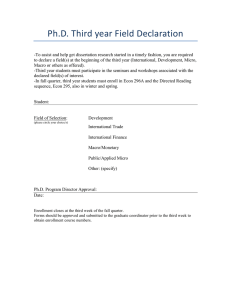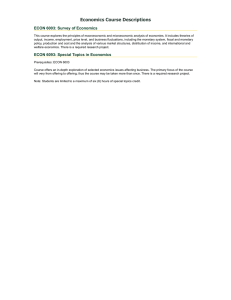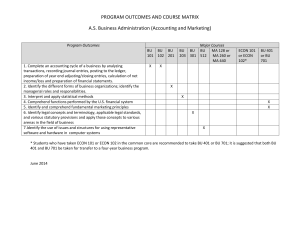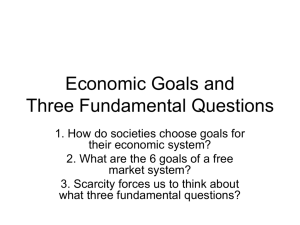Department of Economics Student Outcome Assessment Plan (SOAP) California State University, Fresno
advertisement
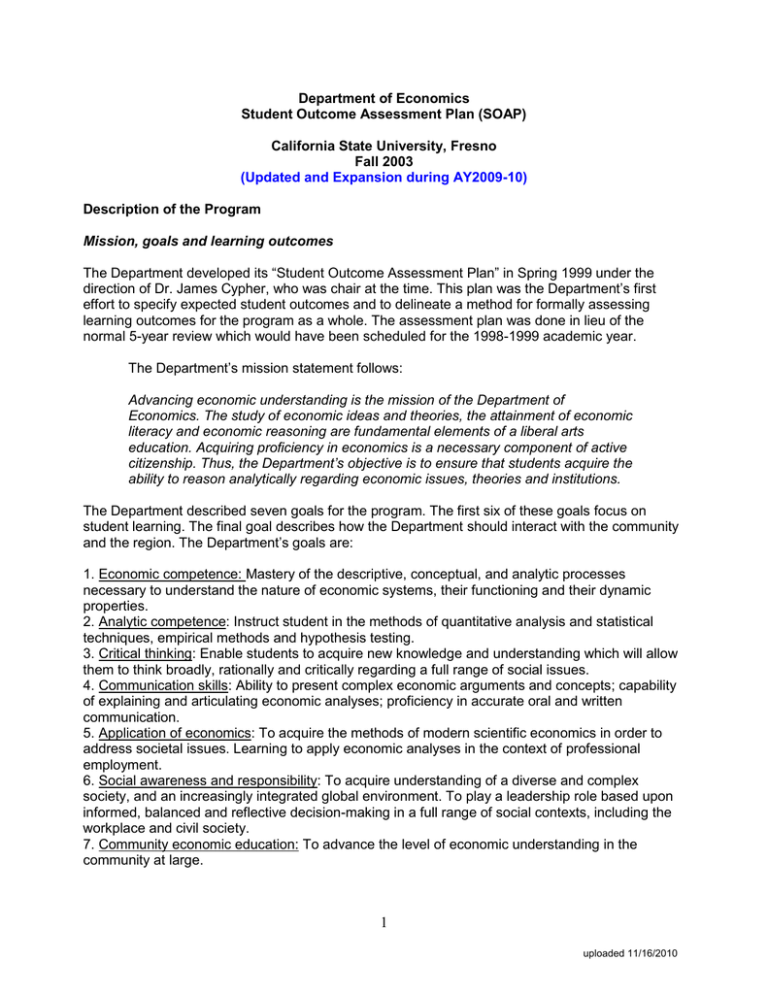
Department of Economics Student Outcome Assessment Plan (SOAP) California State University, Fresno Fall 2003 (Updated and Expansion during AY2009-10) Description of the Program Mission, goals and learning outcomes The Department developed its “Student Outcome Assessment Plan” in Spring 1999 under the direction of Dr. James Cypher, who was chair at the time. This plan was the Department’s first effort to specify expected student outcomes and to delineate a method for formally assessing learning outcomes for the program as a whole. The assessment plan was done in lieu of the normal 5-year review which would have been scheduled for the 1998-1999 academic year. The Department’s mission statement follows: Advancing economic understanding is the mission of the Department of Economics. The study of economic ideas and theories, the attainment of economic literacy and economic reasoning are fundamental elements of a liberal arts education. Acquiring proficiency in economics is a necessary component of active citizenship. Thus, the Department’s objective is to ensure that students acquire the ability to reason analytically regarding economic issues, theories and institutions. The Department described seven goals for the program. The first six of these goals focus on student learning. The final goal describes how the Department should interact with the community and the region. The Department’s goals are: 1. Economic competence: Mastery of the descriptive, conceptual, and analytic processes necessary to understand the nature of economic systems, their functioning and their dynamic properties. 2. Analytic competence: Instruct student in the methods of quantitative analysis and statistical techniques, empirical methods and hypothesis testing. 3. Critical thinking: Enable students to acquire new knowledge and understanding which will allow them to think broadly, rationally and critically regarding a full range of social issues. 4. Communication skills: Ability to present complex economic arguments and concepts; capability of explaining and articulating economic analyses; proficiency in accurate oral and written communication. 5. Application of economics: To acquire the methods of modern scientific economics in order to address societal issues. Learning to apply economic analyses in the context of professional employment. 6. Social awareness and responsibility: To acquire understanding of a diverse and complex society, and an increasingly integrated global environment. To play a leadership role based upon informed, balanced and reflective decision-making in a full range of social contexts, including the workplace and civil society. 7. Community economic education: To advance the level of economic understanding in the community at large. 1 uploaded 11/16/2010 The student learning outcomes are listed below with the relevant goal: 1. Economic competence: a. General education: All students are required to demonstrate knowledge acquisition in the fundamentals of microeconomic theory and analysis, macroeconomic analysis and the fundamentals of international trade and finance. Students will describe the flows of goods, services, resources, expenditures, and incomes in the US and global economies and their component markets and sectors. Students will explain how price signals lead to resource allocation in a market economy. Students will identify the trade-offs faced at all levels of economic activity. b. Upper division: All students are required to demonstrate in depth analysis of complex, advanced knowledge in the field of economics, and in applied areas of analysis. Students will interpret the assumptions behind different economic perspectives or paradigms. Students will apply/use the formal language and concepts of the discipline (theory & praxis) to issues of contemporary and historical relevance. 2. Analytic competence: Mastery of analytical methods of various models and dominant paradigms through comparative analysis, the application of statistical techniques, comparative static analysis and dynamic methods, models and theories. Students will apply formal logical, statistical, and econometric analyses, in order to evaluate a wide array of hypotheses, qualitative- and quantitative evidence and interpret the results. 3. Critical thinking: Intellectual maturity as exhibited through a variety of written and oral presentations, including logical argumentation. Critical thinking through analytical testing of core received ideas and “conventional wisdoms” as advanced in the present historical moment and over the past two hundred and fifty years. Breadth through a variety of course electives, or at the introductory level, through the presentation of conflicting and clashing views in the context of economic policy issues. Students will evaluate contrasting models/paradigms to identify key facts, points of consensus and divergence on issues of contemporary and/or historical relevance. 2 uploaded 11/16/2010 4. Communication skills: Familiarity with and proficiency in communicating economic analysis in group and large audience settings. Ability to explain economic ideas and concepts to both trained and general listeners. Excellent general writing skills in the context of short reports, essays, research papers, reviews and summaries. Ability to communicate with the aid of graphs, tables, formulas, models and other quantitative measures, or formal mathematical concepts. Students will demonstrate proficiency in writing knowledgably, coherently, and persuasively on an array of conceptual and/or real, contemporary and/or historical topics related to the discipline. 5. Application of economics: Applications of knowledge, including core theoretical concepts, to a broad range of social issues. Application of economic analysis, or simulations of actual applications, through exam and assignment format, possibly including surveys and sampling or “situational” type questions and problems which simulate employment applications. Students will practice independent economic research, including—but not limited to— use of professional and scholarly resources, secondary source materials, and statistical/econometric analyses. 6. Social awareness and responsibility: To acquire a comprehensive analysis and understanding of social stratification, the determination of policy decision and processes and the dynamic and institutional properties of economies other than the U.S. through courses emphasizing international content and context. Students will identify the economic causes and consequences of social stratification and describe the policy decisions/processes used to address these. Students will examine the risks and rewards of globalized economic activity from multiple perspectives. 7. Community economic education: To diffuse economic knowledge through public presentations, applied research, grant-supported activities, publications and through print and electronic media. 3 uploaded 11/16/2010 Student Learning Outcomes & Departmental Courses Matrix Economic Competence COURSES \ OBJECTIVES Econ25 IntroEcon I Econ40 P/Micro I Econ50 P/Macro I Econ100A Int Micro R Econ100B Int Macro R Econ101 Hist Thght R Econ102W Expl Lit R Econ110 US EconHist R Econ111 EuroEconHist R Econ114 EconDev/Poor R Econ115T Tpc US Ec Hist R Econ117 Environ Econ R Econ119 Applied Regional R Econ120 Women/ Economy R Econ123 Econometrics A Econ125 Intro/Math Econ R Econ131 Public Econ R Econ135 Money/Bank R Econ140 PolEcon/Military R Econ144 Econ/ Sports I Econ146 Econ/ Crime I Econ150 Labor Econ R Econ152 HumanRes R Econ162 Health Econ I Econ165 Mod Am Econ I Econ167 Cont Econ Prob R Econ174 Govt Regl/Econ R Econ176 Econ Thms/Film I Econ178 Intnt’l Econ R Econ179 Intl Pol Econ R Econ181 Pol Econ/L Am R Econ183 Pol Econ/Mid East R Econ185 Directed Readings R Econ188T Special Topics R Econ189T Tpcs Pub Policy R Econ190 Ind Study A Econ191 Internship A Econ192 Senior Project A CERECC Activities I = Introduced; R = Reinforced; A = Advanced Analytical Comp I I R R R R R R R A R R R R I I R R I I Critical Thinking I I I R R R R R R R R R R Comm. Appl. I I I I R R R R R R R R R R Social Awareness Community Econ Ed I I I I R R R R R R R R A R A R R R R R I I R R I I R R R R R R R A R R R R I I R R I I R R I R R R R R R R R R A A A R R R A A A I I R R R R I R R I I R I R R R R R R R R R R R R A A A R A A A R I I R A R 4 uploaded 11/16/2010 A R Proposed Future Assessment Activities The Department continues to assess student learning outcomes. Several assessment activities are appropriate for on-going use (e.g., the econometric research project and the economics competency test for business students). Other activities, such as the student survey and the alumni survey, are suitable to be repeated periodically. The scope of assessment methods is considerable and the Department seeks to use a variety of modes, dictated by suitability and the personnel-time resources available. Tentative Assessment Activity Time-line AY2009-10 The EWOT Pre/Post Micro Test was piloted in five (5) Econ40 sections during the Fall 2009 semester. (Three instruments, coined the “Economic Way of Thinking” (EWOT), were developed previously by Dr. Don R. Leet to cover fundamental principles from microeconomics, macroeconomics, and international trade for the purpose of assessing knowledge retention from the Principles-level courses by Craig School of Business students. Each instrument is roughly 15 questions addressing general economic competencies.) AY2010-11 EWOT Pre/Post Macro Test administered in six random (6) Econ50 sections. An Alumni Survey will be fielded at the beginning of the Spring semester. Data will be analyzed over the summer of 2011 with responses tabulated for discussion by Department faculty in the Fall of 2011. Department faculty will collaborate on a standardized scoring rubric to be used for future assessment activity for student papers in upper-division classes (Econ101 & above). AY2011-12 EWOT Pre/Post Micro and Macro Tests administered in all Econ40 and Econ50 sections. Most upper-level courses (in Areas A, B, C & D) include a research-paper requirement; these research papers collectively provide an opportunity for faculty to assess student competencies, skills, methods and analytics. Students in one (1) Fall-semester upper-division course will be required to submit two copies of their papers—one for course grading, the other maintained separately for the purpose of assessment. These papers (with student identities obscured) will be assessed using the uniform scoring rubric developed in AY2010-11 with all tenure-track and tenured faculty sharing equally in the task. Conduct a structured Student Focus group of Majors and Minors. AY2012-13 EWOT Pre/Post Macro Tests administered Econ100B Intermediate Macroeconomic Theory to assess concept retention and master beyond the GE-level. Students in one (1) Fall-semester upper-division course will be required to submit two copies of their papers—one for course grading, the other maintained separately for the purpose of assessment. These papers (with student identities obscured) will be assessed using the uniform scoring rubric developed in AY2010-11 with all tenure-track and tenured faculty sharing equally in the task. AY2013-14 EWOT Pre/Post Micro Tests administered Econ100A Intermediate Microeconomic Theory to assess concept retention and master beyond the GE-level. 5 uploaded 11/16/2010 Department SOAP coordinator will conduct a statistical analysis of institutional data (grade distributions, retention, graduation rates, demographics, etc.) and prepare these for discussion with the Department faculty. AY2014-15 EWOT Pre/Post Micro and Macro Tests administered in all Econ40 and Econ50 sections. Students in Spring-semester Econ123 will be required to submit two copies of their papers— one for course grading, the other maintained separately for the purpose of assessment. These papers (with student identities obscured) will be assessed using the uniform scoring rubric developed in AY2010-11 with all tenure-track and tenured faculty sharing equally in the task. AY2015-16 EWOT Pre/Post International Tests administered Econ178 International Economics to assess concept retention and master beyond the GE-level. An Internship-Supervisors’ Survey will be fielded at the beginning of the Spring semester. Data will be analyzed over the summer of 2011 with responses tabulated for discussion by Department faculty in the Fall of 2011. Process for Program Integrity & Improvement To continue carrying out the stated mission of the Department of Economics, in conjunction with the mission of the University and its Colleges, this assessment plan reflects an iterative process to address weaknesses, build upon strengths, and maintain the integrity and currency of our scholarly discipline. The Figure below illustrates the intended process. Periodic Program Review Department Faculty Address deficiencies Curriculum & Courses Mission, Goals & Learning Outcomes Assessment Evaluation Alumni Outcomes Assessment Students Employers 6 uploaded 11/16/2010 Student Learning Objectives & Potential Assessment Modalities Direct Methods Objective: Economic Competence demonstrate knowledge acquisition in fundamentals. demonstrate in-depth, advanced, complex knowledge. Course Embedded Other Exams X X Systematic Review Indirect Methods Capstone X X X X Survey Focus Group X X Other X Analytic Competence mastery of analytical methods. X Critical Thinking describe, explain & contrast different positions/ conclusions. strategize & execute hypothetical & realworld problem-solving. X X X X X X X X X X X X X X Communication Skills demonstrate intellectual maturity in written argument. demonstrate intellectual maturity in oral argument. ability/proficiency in public speaking. ability/proficiency in quantitative/ analytical communication. X X X X X X X X X X X Application of Economics application of concepts/ methods. X X application/ recognition of concepts/ methods in social issues. X X X X X X Social Awareness Illustration of the causes/ consequences of social & economic diversity. X 7 uploaded 11/16/2010 Assessment Activities & Tentative Timeline. Objective: Economic Competence I II III IV V VI VII AY09-10 AY10-11 AY11-12 AY12-13 AY13-14 AY14-15 AY15-16 X X X X X X X X X X X demonstrate knowledge acquisition in fundamentals. demonstrate in-depth, advanced, complex knowledge. Analytic Competence mastery of analytical methods. X X X X X X X X X X X X X X Critical Thinking describe, explain & contrast different positions/ conclusions. strategize & execute hypothetical & realworld problem-solving. Communication Skills demonstrate intellectual maturity in written argument. demonstrate intellectual maturity in oral argument. ability/proficiency in public speaking. ability/proficiency in quantitative/ analytical communication. Application of Economics application of concepts/ methods. application/ recognition of concepts/ methods in social issues. Social Awareness X Illustration of the causes/ consequences of social & economic diversity. 8 uploaded 11/16/2010

